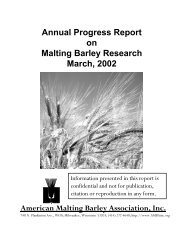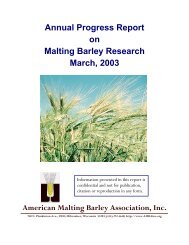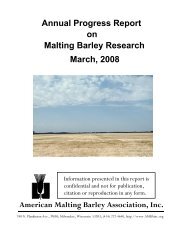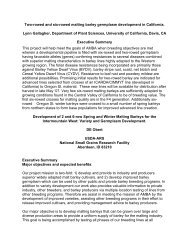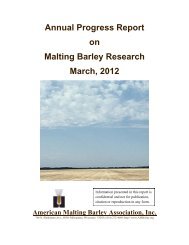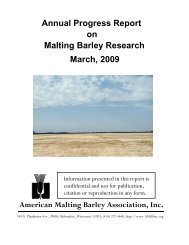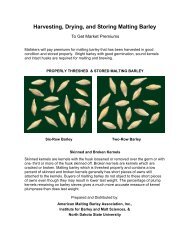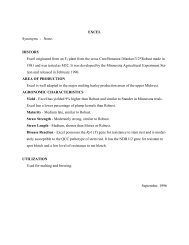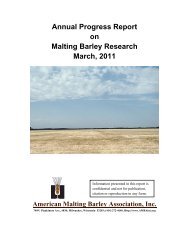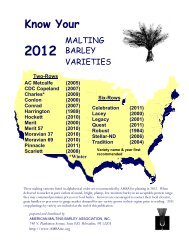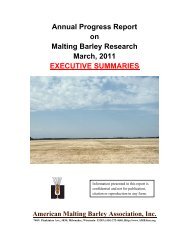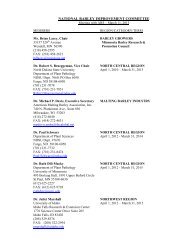Annual Progress Report on Malting Barley Research March, 2007
Annual Progress Report on Malting Barley Research March, 2007
Annual Progress Report on Malting Barley Research March, 2007
Create successful ePaper yourself
Turn your PDF publications into a flip-book with our unique Google optimized e-Paper software.
much of North Dakota in 2006, few fields were detected with diseases. A total of 105 fields<br />
were sampled. This was less than half of the number sampled in 2005 because the area of<br />
barley sown in 2006 was significantly less than in previous years and disease was low so<br />
that finding crops to survey took much more of the scout’s time.<br />
Scouts examined 10 plants in five locati<strong>on</strong>s per field, sampling in a W pattern. Informati<strong>on</strong><br />
collected at each site included district, county, field locati<strong>on</strong>, GPS locati<strong>on</strong>, growth stage,<br />
previous crop, and incidence and severity of major diseases and insects. Data were<br />
recorded <strong>on</strong> hand held iPAQ computers equipped with an Excel spreadsheet. Informati<strong>on</strong><br />
was forwarded at the end of each week to NDSU at Fargo. Data were mapped using ARC-<br />
INFO GIS software, and <strong>on</strong> M<strong>on</strong>day mornings reports were uploaded to the web at<br />
http://www.ag.ndsu.nodak.edu/aginfo/ndipm/. Extensi<strong>on</strong> staff, c<strong>on</strong>sultants, farmers and the<br />
general public are able to view the site immediately. On an accompanying web page Dr<br />
McMullen summarizes and interprets the informati<strong>on</strong> c<strong>on</strong>tained in the disease maps. An<br />
example of part of the June 19-23 pest report by Dr McMullen follows,<br />
“WHEAT AND BARLEY DISEASE OBSERVATIONS, June 19-23<br />
……. NDSU IPM’s summer field scouts surveyed ….. 11 barley fields during the week of<br />
June 19-23. The average growth stage of these crops during that week was Zadoks 40 =<br />
the boot stage, with a wide range of growth stages, from 2 leaf to soft dough.……<br />
<strong>Barley</strong>: Leaf spots were comm<strong>on</strong>ly found by field scouts, but were not severe. The barley<br />
growth stage averaged Zadoks 40 = boot stage at the time. Two of the four headed barley<br />
fields had loose smut, with a 4 and 10% incidence of infected tillers.<br />
Fusarium head blight: For Fusarium head blight, some NDAWN stati<strong>on</strong>s indicated that<br />
weather had been favorable for moderate risk of Fusarium head blight…. This area of risk<br />
is small and is similar to last week’s areas of risk, primarily in the northcentral tier of<br />
counties. ”<br />
In 2006 diseases were less comm<strong>on</strong> and less severe than in the last three years, probably<br />
because of the well below average rainfall during the tillering and heading stages of crop<br />
growth. Early in the seas<strong>on</strong> almost no disease was found <strong>on</strong> barley except for some minor<br />
spot blotch symptoms and an occasi<strong>on</strong>al BYDV affected plant. By late June, leaf spots<br />
were comm<strong>on</strong> but not severe and some fields that had not been seed treated were showing<br />
symptoms of loose smut. By the beginning of July spot blotch was being detected in all<br />
fields and aphid and thrip numbers had increased to damaging levels although no FHB was<br />
detected in fields that had emerged heads. As July progressed aphids and thrips became<br />
more comm<strong>on</strong> and patches of BYDV affected plants were frequently found, presumably as<br />
the aphids are a vector for this disease. FHB at low severity was detected in <strong>on</strong>ly a very<br />
few fields. By the end of July most crops were ripe, but those that were planted later and<br />
were still green had little leaf disease detectable and no FHB was detected.<br />
65



